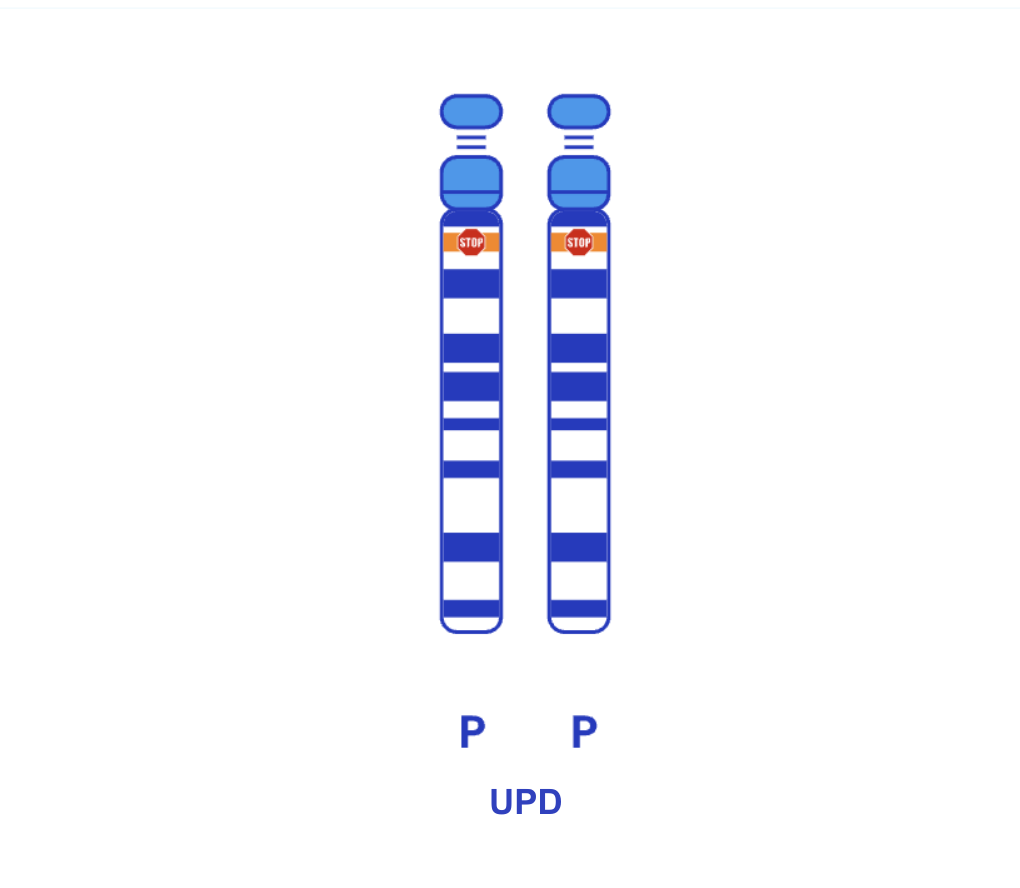About Angelman Syndrome
AS Genotypes: UPD
Uniparental disomy (UPD) is when both copies of a chromosome pair came from one parent, instead of the usual one chromosome from the egg, one chromosome from the sperm. UPD AS happens when both copies of chromosome 15 came from the father. Because the paternal UBE3A gene is always turned off in neurons, when both copies of chromosome 15 come from the father, both UBE3A genes are turned off, and no UBE3A protein is made in the brain.
Uniparental disomy (UPD) is when both copies of a chromosome pair came from one parent, instead of the usual one chromosome from the egg, one chromosome from the sperm.

In most cases, UPD is a random event that occurred in the formation of the sperm or egg, or early in the development of an embryo. However, sometimes UPD is the result of a chromosome difference in a parent that makes UPD more likely to occur. Consequently, chromosomal testing of the parents is recommended. If the parents have chromosomal testing that is typical, the chance for a future child to have UPD that causes AS is predicted to be less than 1%. This means that at least 99% of the time, future children will not have UPD that causes AS. This chance is not zero because rare cases have been reported where chromosome 15 is more likely to be packaged incorrectly when eggs are made, resulting in an increased chance for UPD. If a parent has a chromosomal difference, the chance will depend on the specific chromosomal difference.
UPD is functionally similar to ICD, so you may see them grouped together in the AS literature. In contrast to AS deletions, where millions of base pairs of DNA on the maternal chromosome 15 are missing, those with UPD are not missing a single base pair of DNA—which generally makes their features less severe.
FAST puts enormous resources behind fighting for the inclusion of UPD/ICD in both research as well as clinical trials. All the pharma companies in our space have stated that they want to have the most consistent group for the earliest phases of clinical trials (Phase 1/2), and in many cases they want the most severely affected to start with. That is generally considered deletions. Once they can show safety (Phase 1) and early efficacy (Phase 2)—which are generally run together in trials as a Phase 1/2—then they will likely add a cohort of other genotypes.
You can read more about the future of UPD/ICD inclusion in trials in this Q&A with FAST Chief Science Officer Allyson Berent.
Connect with other AS UPD families by writing to us here: community@cureangelman.org
Still have questions?
If you are wondering about your specific chance to have a child with a genetic variant that causes AS, it is very important to consult a genetics professional like a genetic counselor or geneticist. The chance varies depending upon the test results of the person living with AS and the testing that was performed on the parent(s). The information provided here may be helpful but it is not specific to your family and is not meant to replace genetic counseling.